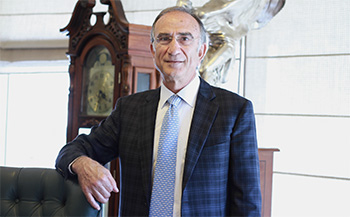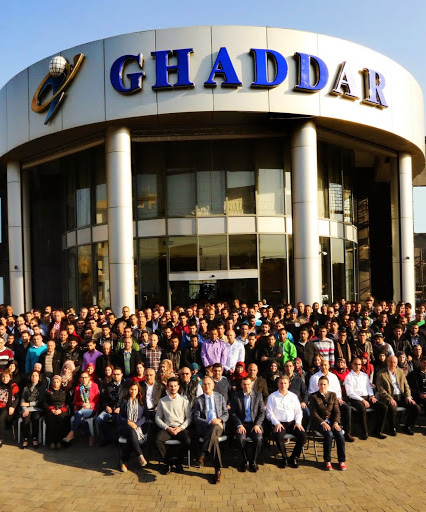Ghaddar Machinery Company: Manufacturing and Distributing Products Across the Region
Having a partnership with two renowned suppliers has made us renowned in the region. Using the latest technology in machinery, hiring talented engineers and technicians, keeping the manufacturing processes in line, wearing the customers’ shoes have all become our badge, and kept the customers faith in our products.
Interview with Mohammed Samih Ghaddar, Chairman of Ghaddar Machinery Company

Could you please start by giving us a brief history of Ghaddar Machinery?
We started as a distributor for Perkins Engines. We were dealing in generating sets with different engines. When we approached Perkins twenty-five years ago, we asked them if we could be the exclusive distributor in Lebanon. In those days they used to sell about 10 engines a year to this country. When we approached them about exclusive distributorship, they said we had to buy 100 engines a year. We immediately agreed because we knew the potential and we knew our capability and credibility. The first year we bought 300 engines instead of 100. Everyone at the administration of Perkins was amazed. We became their top sales point for many years. That is on the distribution side. We do something else too. We manufacture generating sets. We started this business with the renowned Perkins and Leroy-Somer. These two suppliers are very well known in their fields. We have grown with them and we produce an excellent product that competes at the international level.
Having a partnership with two renowned suppliers has made us renowned in the region. Using the latest technology in machinery, hiring talented engineers and technicians, keeping the manufacturing processes in line, wearing the customers’ shoes have all become our badge, and kept the customers faith in our products.
We have a presence in Lagos, Nigeria. We have our own factory there. We have another factory in Sharjah, UAE. And very soon we are going to open another factory, maybe in partnership, in Saudi Arabia. We have a big customer base all over the world.
And do you distribute to other countries in the region?
We have distributors in Southeast Asia, Middle East, the near East, Africa and Latin America. In addition, we have our factories in Nigeria and the UAE.
Privatization or private-public partnerships could be an excellent choice for Lebanon. The private sector can rehabilitate all the sectors it gets involved in. It will be beneficial both to the country and the private company.
What is the advantage to having Lebanon as the hub of your operations, as opposed to all of the other regions you are operating in?
Lebanon is our native country. Lebanon is strategically located. This gives us easy access to the neighboring countries, which are our main customers. Here we also have access to skilled engineers and technicians. It’s also important to me to create jobs so our people can stay here, in our country. This is part of our patriotic duty.
Our top clients are mainly our distributors. We also have big users like telecom companies and governmental bodies as clients.
Could you describe to us some of your main competitive advantages?
We always keep a big inventory. This gives us an advantage over other manufacturers. We can offer the customer any quantity at any time, according to their needs. Another advantage we have is that we buy in large volumes from our suppliers; this assures us the best purchase price. We also have the biggest manufacturing facility in Lebanon, and the Middle East.
One of the company’s missions is to embrace corporate social responsibility and environmental protection. We also discussed job creation. What is Ghaddar doing to progress this mission?
Ghaddar Machinery has launched a welfare program to help students. We have funding for 2500 students a year. We have been doing this for the past 15 years. We have also set up a Welfare Association, to help people in need. As for the environment, our industry uses wood, steel, oil and water. We recycle the wood and steel. The water is being treated. The oil is being disposed for burning in industrial ovens.
How has the regional instability effected the company’s advancement?
If you don’t speculate, you don’t accumulate. We live in a turbulent region where the need for power generation is greater than in stable countries. The instability in the region has severely affected the public power grids and increased demand on diesel power generation. Although our risks are higher here, we have speculated on manufacturing here. I think we have made the right choice.
Have your exports slowed down due to global economic downturn?
If you’re talking about the downturn in 2008, yes it has gone down by 30 to 35%, while in Europe and America the decrease was about 80%. We managed to recoup the losses in about 4 years. Now we are back to our normal levels. This year, the demand in the first quarter was not up to our expectations but the second and third quarters have been good, up to expectations.
What is your view on privatization, public-private partnerships, and taxes in Lebanon? And what is your outlook for 2015?
Privatization or private-public partnerships could be an excellent choice for Lebanon. The private sector can rehabilitate all the sectors it gets involved in. It will be beneficial both to the country and the private company. The government has always been a bad manager. Therefore privatization is the best choice. As for taxation and the VAT in Lebanon, if we analyze it and compare it to other countries in the region, we see that it is acceptable. In Lebanon, tax policies are helping industry. They do this to keep industrialists at home in spite of the instability.
What do you think is the outlook for 2015?
It’s obscured. We cannot see the light at the end of the tunnel because of the instability. In Lebanon, we work is on a day-to-day basis. We cannot plan for years ahead. We just do our jobs, do business with others and we rely on God.
What is your assessment of industrial development in Lebanon? How competitive is it compared to neighboring countries like Jordan, Syria etc?
The industrial sector in Lebanon has the top spot in the region in the sectors of jewelry, power generating sets and transformers. But in mass production sectors like the textile industry, we are not very competitive.
Is there anything specific about the company you would like to say to our international viewers?
All we want is stability in Lebanon. That is our main problem and hurdle. It makes us anxious every day.
FAIR USE POLICY
This material (including media content) may not be published, broadcasted, rewritten, or redistributed. However, linking directly to the page (including the source, i.e. Marcopolis.net) is permitted and encouraged.